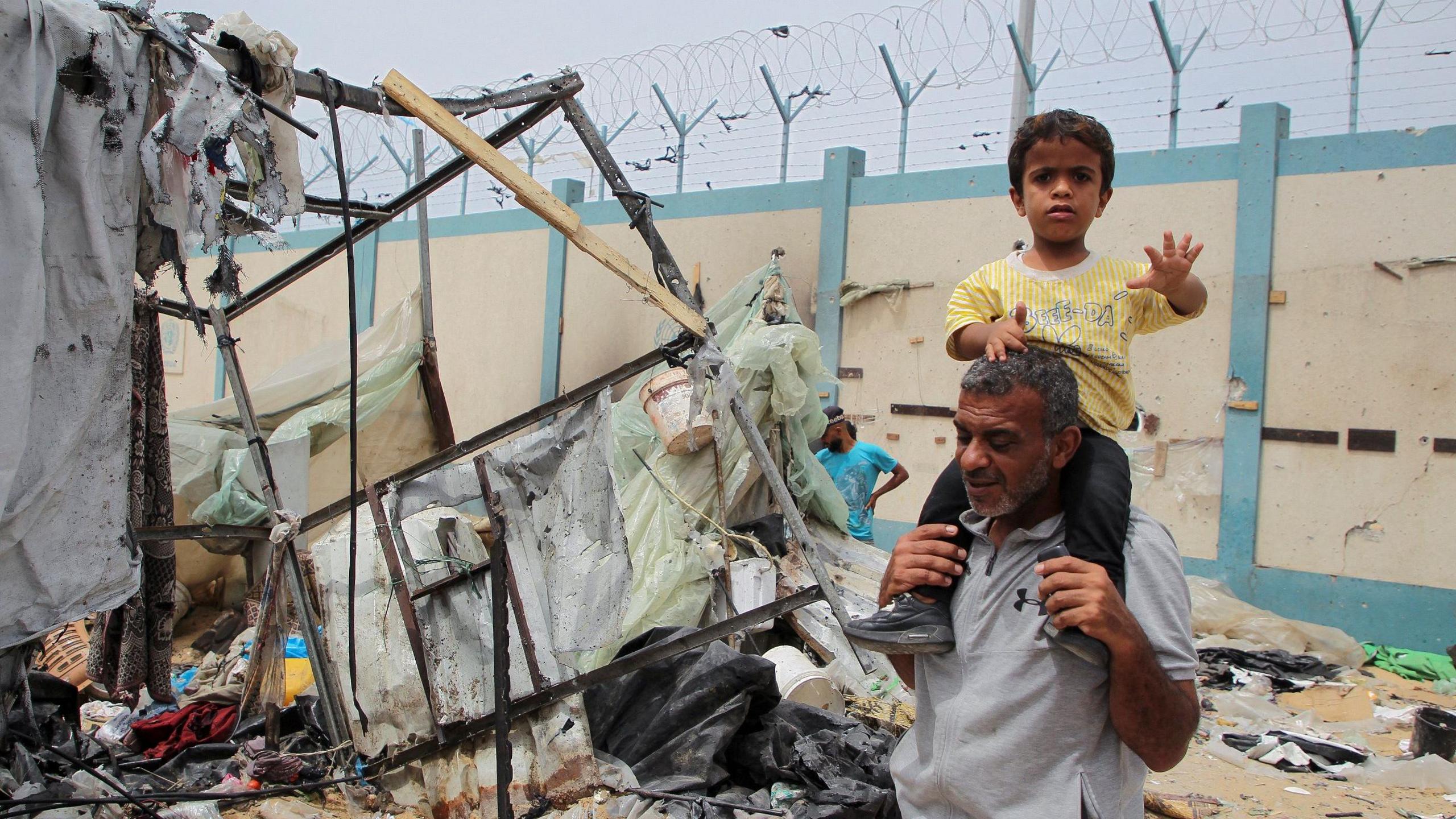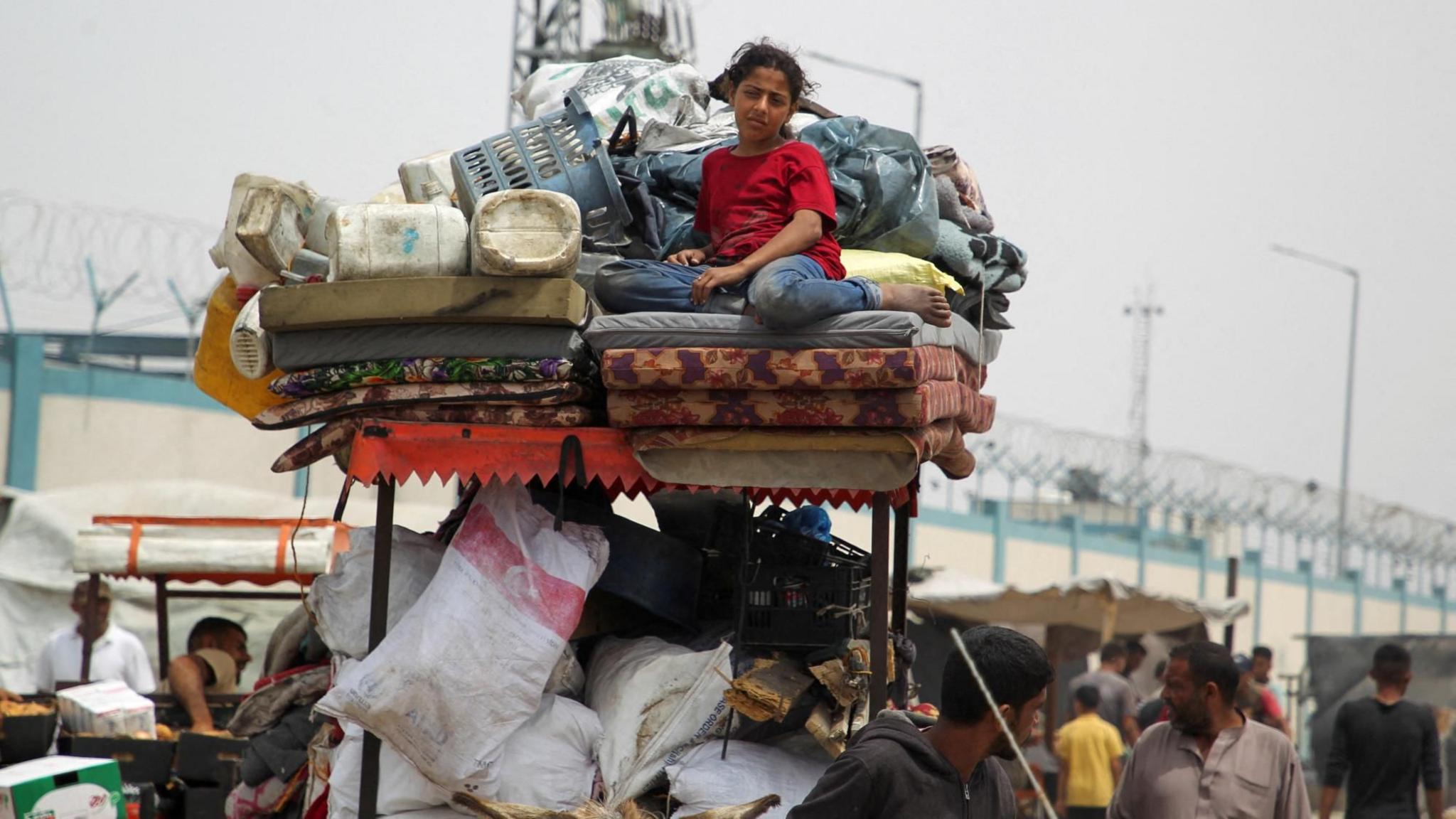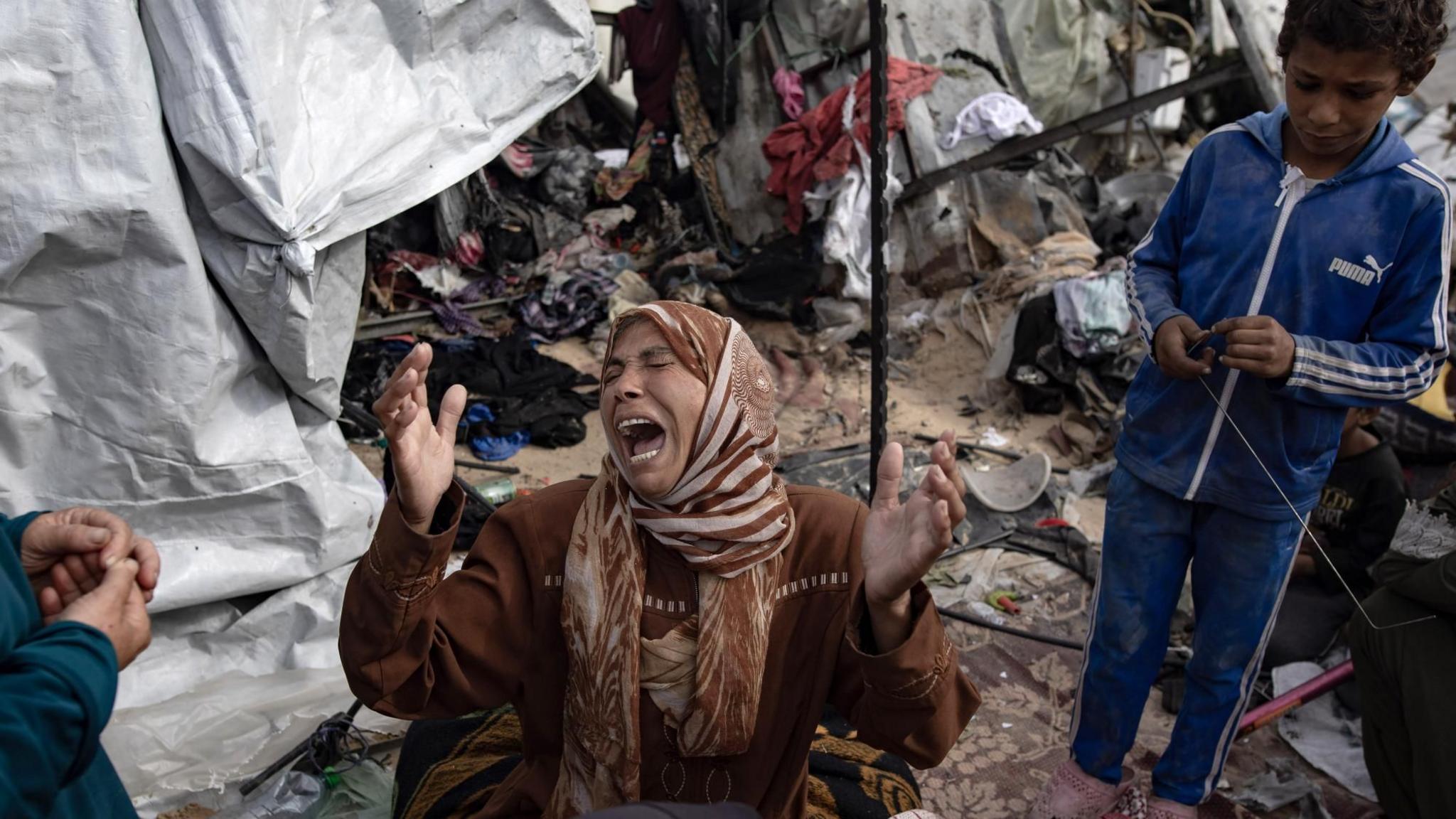Israeli tanks reach central Rafah as strikes continue

- Published
Israeli forces have reportedly reached the centre of the southern Gaza city of Rafah and seized a strategically important hill overlooking the nearby border with Egypt.
Witnesses and local journalists said tanks were stationed at al-Awda roundabout, which is considered a key landmark.
They also said tanks were on Zoroub Hill, effectively giving Israel control of the Philadelphi Corridor - a narrow strip of land running along the border to the sea.
The Israeli military said its troops were continuing activities against "terror targets" in Rafah, three weeks after it launched the ground operation there.
Western areas of the city also came under intense bombardment overnight, residents said, despite international condemnation of an Israeli air strike and a resulting fire on Sunday that killed dozens of Palestinians at a tented camp for displaced people.
The Israeli military said it was investigating the possibility that the fire was caused by the explosion of weapons stored by Hamas in the vicinity.
It also denied reports from local health and emergency services officials on Tuesday afternoon that tank shells had hit another camp in al-Mawasi, on the coast west of Rafah, killing at least 21 people.
Reuters news agency cited local health officials as saying the blast occurred after Israeli tank shells hit a cluster of tents in al-Mawasi on Tuesday. An official in the Hamas-run civil defence force also told AFP there had been a deadly Israeli strike on tents.
Videos posted to social media and analysed by BBC Verify showed multiple people with serious injuries, some lying motionless on the ground, near tents and other temporary structures.
There was no clear sign of a blast zone or crater, making it impossible to ascertain the cause of the incident. The location - verified through reference to surrounding buildings - is between Rafah and al-Mawasi, and lies south of the IDF's designated humanitarian zone.
The IDF said in a statement: "Contrary to the reports from the last few hours, the IDF did not strike in the humanitarian area in al-Mawasi."
Israel has insisted that victory in its seven-month war with Hamas in Gaza is impossible without taking Rafah and rejected warnings that it could have catastrophic humanitarian consequences.
The UN says around a million people have now fled the fighting in Rafah, but several hundred thousand more could still be sheltering there.
Israeli tanks in the heart of Rafah amid intense shelling of city
- Published28 May 2024
Netanyahu vows to continue war amid air strike condemnation
- Published28 May 2024
Dozens reported killed in Israeli strike on Rafah
- Published27 May 2024
The Israel Defense Forces (IDF) began what they called “targeted” ground operations against Hamas fighters and infrastructure in the east of Rafah on 6 May.
Since then, tanks and troops have gradually pushed into built-up eastern and central areas while also moving northwards along the 13km (8-mile) border with Egypt.
On Tuesday, they reportedly reached the city centre for the first time.
The al-Awda roundabout, which is only 800m (2,600 ft) from the border, is the location of major banks, government institutions, businesses, and shops.
One witness said they saw soldiers position themselves at the top of a building overlooking the roundabout and then begin to shoot at anyone who was moving.
Video posted online meanwhile showed tank track marks on a road about 3km west of al-Awda roundabout and 300m from the Indonesian field hospital, which was damaged overnight.

The UN says around a million people have fled Rafah since the start of the Israeli ground operation in the city
Earlier, residents told the BBC that tanks seized Zoroub Hill, about 2.5km north-west of al-Awda roundabout, after gun battles with Hamas-led fighters.
The hill is highest point along the Egyptian border and its seizure means the entire Gazan side of the border is now effectively under Israeli control.
Zoroub Hill also overlooks western Rafah, where residents said there had been the heaviest air and artillery strikes overnight since the start of the Israeli operation.
A local journalist said the bombardment forced hundreds of families to seek temporary shelter in the courtyard of a hospital, while ambulances struggled to reach casualties in the affected areas.
At dawn, thousands of people were seen heading north, crammed into cars and lorries and onto carts pulled by donkeys and horses.
"The explosions are rattling our tent, my children are frightened, and my sick father makes it impossible for us to escape the darkness,” resident Khaled Mahmoud told the BBC.
“We are supposed to be in a safe zone according to the Israeli army, yet we have not received evacuation orders like those in the eastern [Rafah] region,” he added. “We fear for our lives if no-one steps in to protect us.
The Israel Defense Forces (IDF) did not comment on the various reports but put out a statement saying that “overnight troops operated on the Philadelphi Corridor while conducting precise operational activity based on intelligence indicating the presence of terror targets in the area”.
“The activity is being conducted as efforts are continuing to be made in order to prevent harm to uninvolved civilians in the area,” it added.
“The troops are engaging with terrorists in close-quarters combat and locating terror tunnel shafts, weapons, and additional terrorist infrastructure in the area.”
The IDF has told civilians in eastern Rafah to evacuate for their own safety to an “expanded humanitarian area” stretching from al-Mawasi, a coastal area just north of Rafah, to the central town of Deir al-Balah.

Israel's prime minister said the killing of civilians in an air strike and resulting fire in Rafah on Sunday was a "tragedy"
On Sunday night, at least 45 people - more than half of them children, women and the elderly - were killed when an Israeli air strike triggered a huge fire in a camp for displaced people near a UN logistics base in the Tal al-Sultan area, according to the Hamas-run health ministry.
Hundreds more were treated for severe burns, fractures and shrapnel wounds.
The IDF said it was targeting two senior Hamas officials in the attack, which happened hours after Hamas fighters in south-eastern Rafah launched rockets towards the Israeli city of Tel Aviv for the first time in months.
Israeli Prime Minister Benjamin Netanyahu said a “tragic incident” had occurred “despite our immense efforts to avoid harming non-combatants” and promised a thorough investigation.
IDF chief spokesman Rear Admiral Daniel Hagari said on Tuesday that the strike had targeted a structure used by the Hamas commanders which was away from any tents, using “two munitions with small warheads”.
“Following this strike, a large fire ignited for reasons that are still being investigated. Our munitions alone could not have ignited a fire of this size,” he said.
Rear Adm Hagari added that investigators were looking into the possibility that the fire was caused by the explosion of weapons or ammunition stored in a nearby structure, and played what he said was an intercepted telephone conversation between two Gazans suggesting that. The audio recording could not immediately be verified.
Sam Rose of the UN agency for Palestinian refugees, Unrwa, told the BBC from western Rafah that the killing of so many civilians could not be dismissed as an accident.
“Gaza was already one of the most overcrowded places on the planet. It is absolutely impossible to prosecute a military campaign involving large-scale munitions, strikes from the sky, the sea, the tanks, without exacting large-scale civilian casualties,” he said.
“It seems like we are plumbing new depths of horror, bloodshed and brutality with every single day. And if this isn’t a wake-up call, then it’s hard to see what will be.”
Last week, the International Court of Justice (ICJ) ordered Israel to “immediately halt its military offensive, and any other action in the Rafah Governorate, which may inflict on the Palestinian group in Gaza conditions of life that could bring about its physical destruction in whole or in part”.
Israel launched a military campaign in Gaza to destroy Hamas in response to the group's cross-border attack on southern Israel on 7 October, during which about 1,200 people were killed and 252 others were taken hostage.
At least 36,090 people have been killed in Gaza since then, according to the Hamas-run health ministry.